Columbus Restaurants Forced To Adapt To Pandemic Restrictions
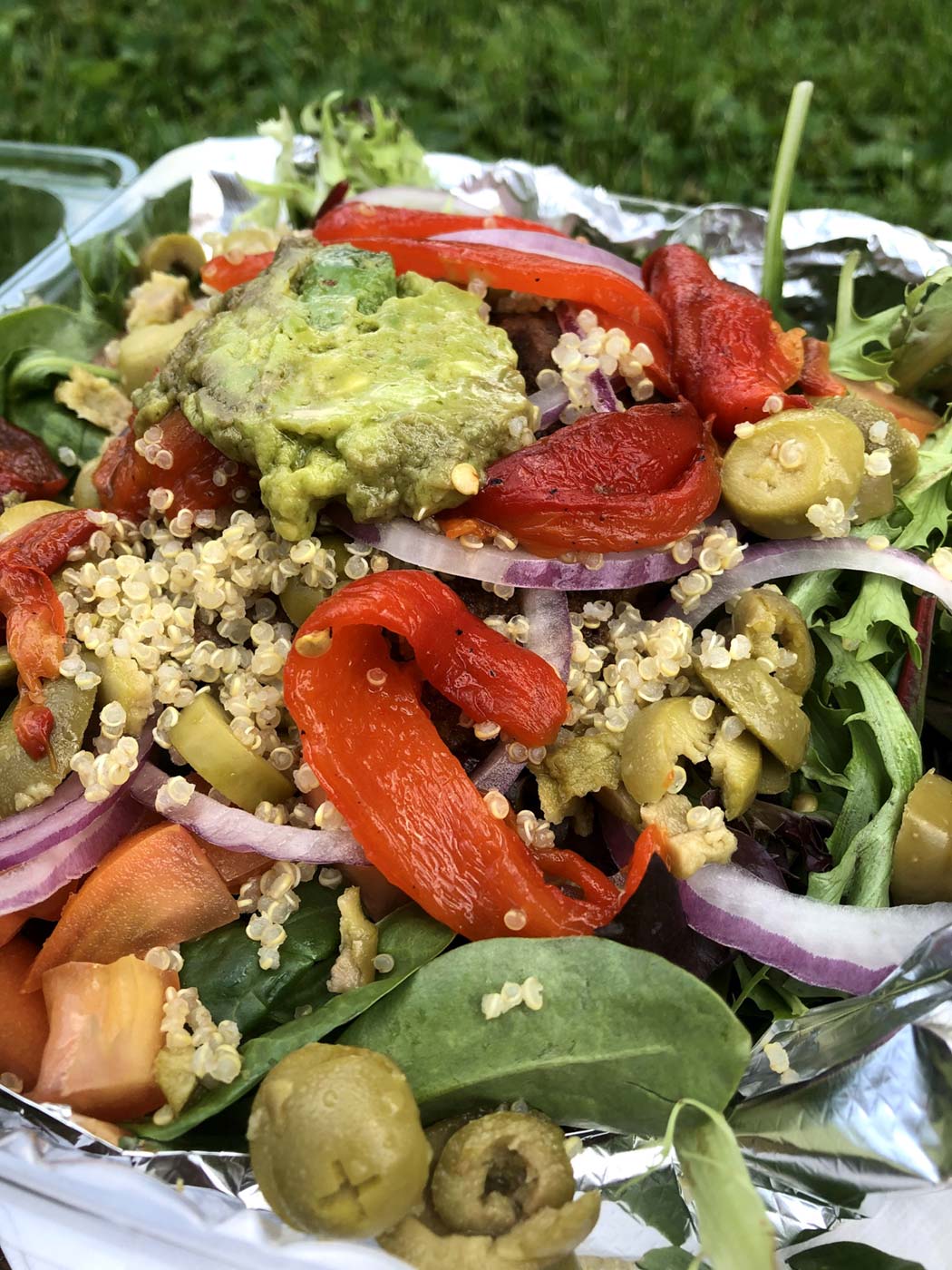
Caryout items from Flavor 91 include the 91 Salad with grass-fed beef and avocado. Photo by Lauren Kurtz.
The first blow for many Columbus restaurants came when spectators were banned at the Arnold Sports Festival, an event that brings 250,000 people to town for the first week in March. The lost revenue from athletes and fans was hard for hospitality venues to understand because Ohio had no cases of COVID-19 at that point.
Within two weeks, things had turned darker. As cases grew and people were hospitalized, Gov. Mike DeWine ordered widespread closings—schools, entertainment venues and nonessential businesses. On March 15, all Ohio bars and restaurants were closed to in-house patrons.
Many restaurants stayed open for carryout and delivery service. Others, seeing no profit in it, closed completely. Widespread layoffs of restaurant workers followed. No business was untouched.
These are stories of how some local restaurants faced the challenge.
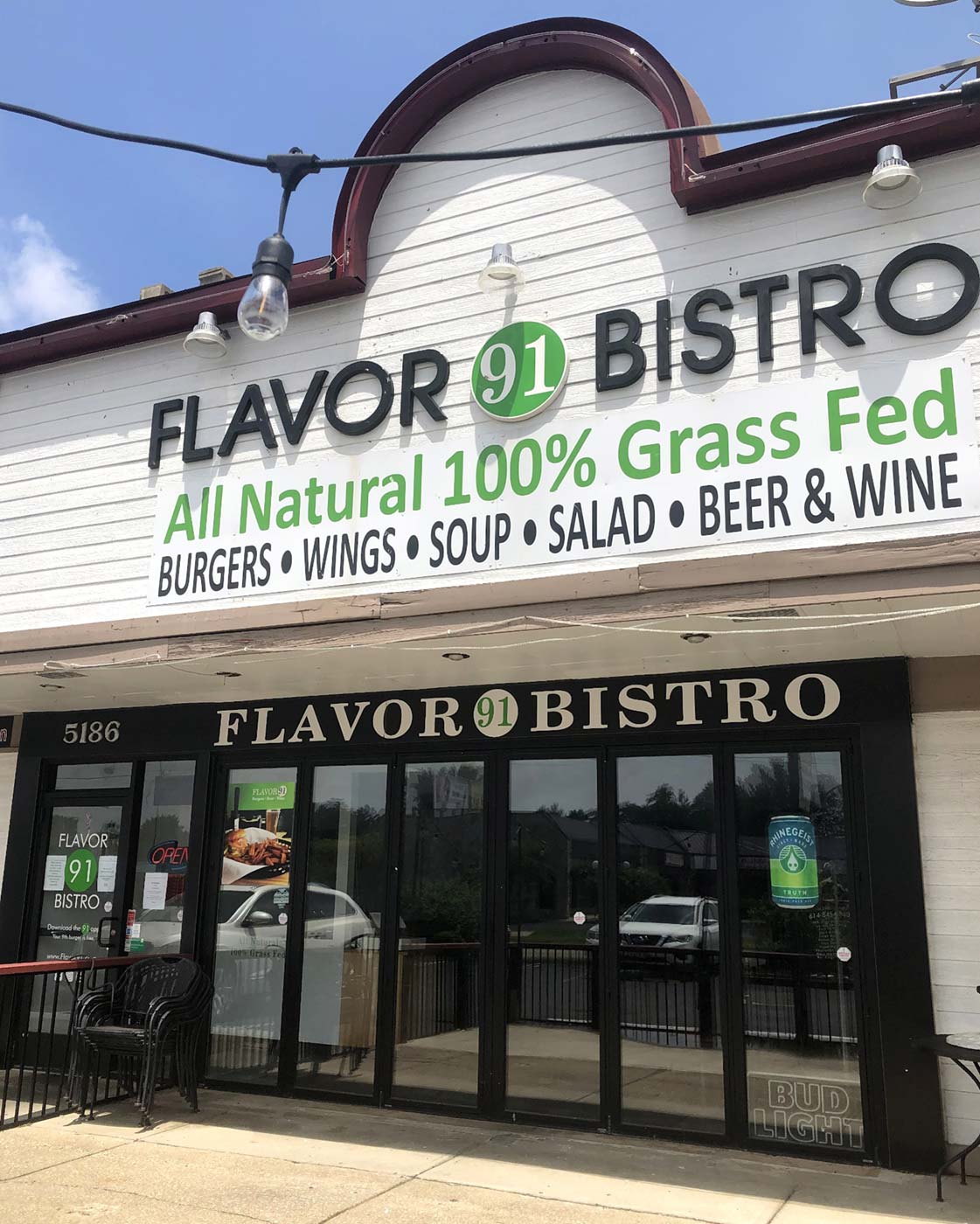
Although the state allowed restaurants to open, Flavor 91 in Whitehall is still studying how to do that safely. Photo by Lauren Kurtz.
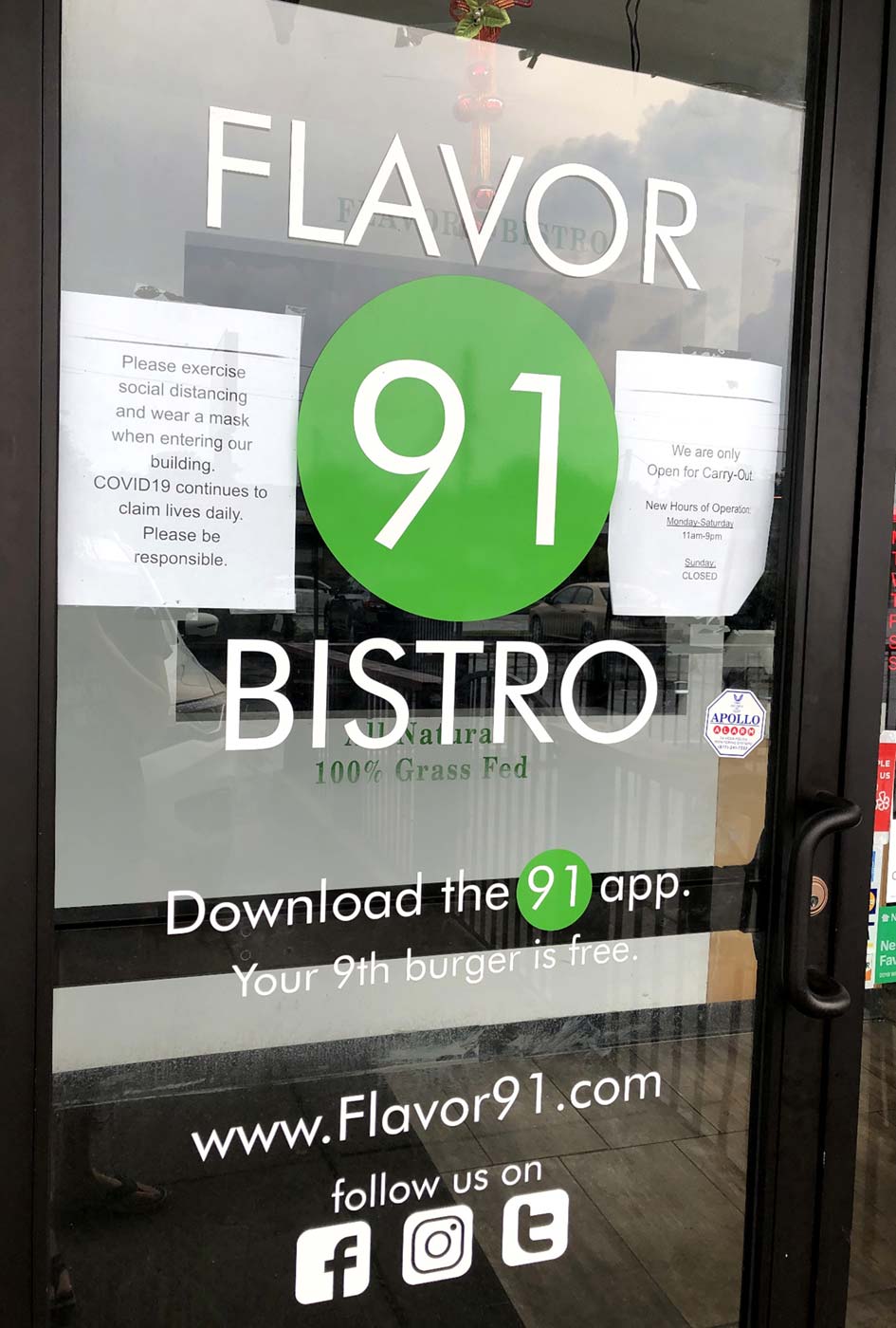
The door to Flavor 91 includes signage asking customers to maintain social distancing. Photo by Lauren Kurtz.
FLAVOR 91: KEEPING IT FRESH
French fries just aren’t great for carryout.
That was one of the many challenges Moses Hayelom of Flavor 91 Burger Bistro faced when the state closed down dining-room service in Ohio’s restaurants in mid-March.
The Whitehall farm-to-table restaurant famous for its wings, burgers and Ethiopian-inspired specialties was just one of thousands of eateries forced to radically adapt their business for carryout only.
Some of the changes were major, of course, like the drop in business and the difficulties getting ingredients and other supplies during a global pandemic. Others were smaller, like how to serve fries that weren’t going to be soggy and cold by the time a customer got to eat them.
“Everyone knows they’re just no good if they sit and they get cold,” he said.
To manage this, if someone orders fries, the kitchen staff cooks the rest of the order and then waits for the customer to arrive before cooking the fries. That way the fries go out the door hot.
“And you know you’re going to pop open the box and eat a few on the way home,” Hayelom said. “This way they’ll be hot.”
Adapting to the circumstances in big ways and small is what has seen Flavor 91 through, said Hayelom and his business partner and mother, Winnie Alemayoh.
She called their long commitment to sourcing ingredients from local, small-scale producers a blessing that has helped them avoid some of the supply issues other restaurants have encountered, particularly with meat. Flavor 91 sources its meat from Athens-area RL Valley Ranch, with whom they’ve had a long relationship.
They’re a small operation and they don’t need to slaughter a lot of animals at once, Alemayoh said. They can time the butchering to suit their customers’ needs. It works out well because restaurants get fresh ingredients when they need them. “The meat doesn’t get processed and then sit,” she said.
And with a long relationship, suppliers are understanding when restaurants order less and restaurants are understanding when suppliers may not always have the ingredients restaurants are looking for.
“It’s a benefit to be small and nimble,” Hayelom said, referring to both the restaurant and its local suppliers.
Supportive customers also have kept Flavor 91 running, both financially and emotionally, the pair said. “Our regular people really came through,” Alemayoh said. “They want to help and they want to support us. That shows really a lot about humanity.”
Longtime regulars and new guests alike have been encouraging and patient, they said. Sometimes their favorite dish isn’t available, and sometimes the restaurant has to make substitutions. Also, customers have adapted to the carryout routine, which involves paying by phone and wearing a mask for pickup.
Mother and son both were skeptical that they can safely reopen dining room service anytime soon, even as the state is removing restrictions on service. Whatever they do next, they’ll have to make sure the staff and the guests feel safe.
“The whole purpose of going out is to sit together and enjoy each other and to talk, but if you have to be six feet away, how does that happen?” Alemayoh asked.
Until the dining room service can reopen, Flavor 91 fans can count on takeout meals, complete with hot fries fresh out of the fryer.
Flavor 91, 5186 E. Main St., is open for lunch and dinner Monday through Saturday. Learn more about the restaurant at flavor91.com.
—Wynne Everett
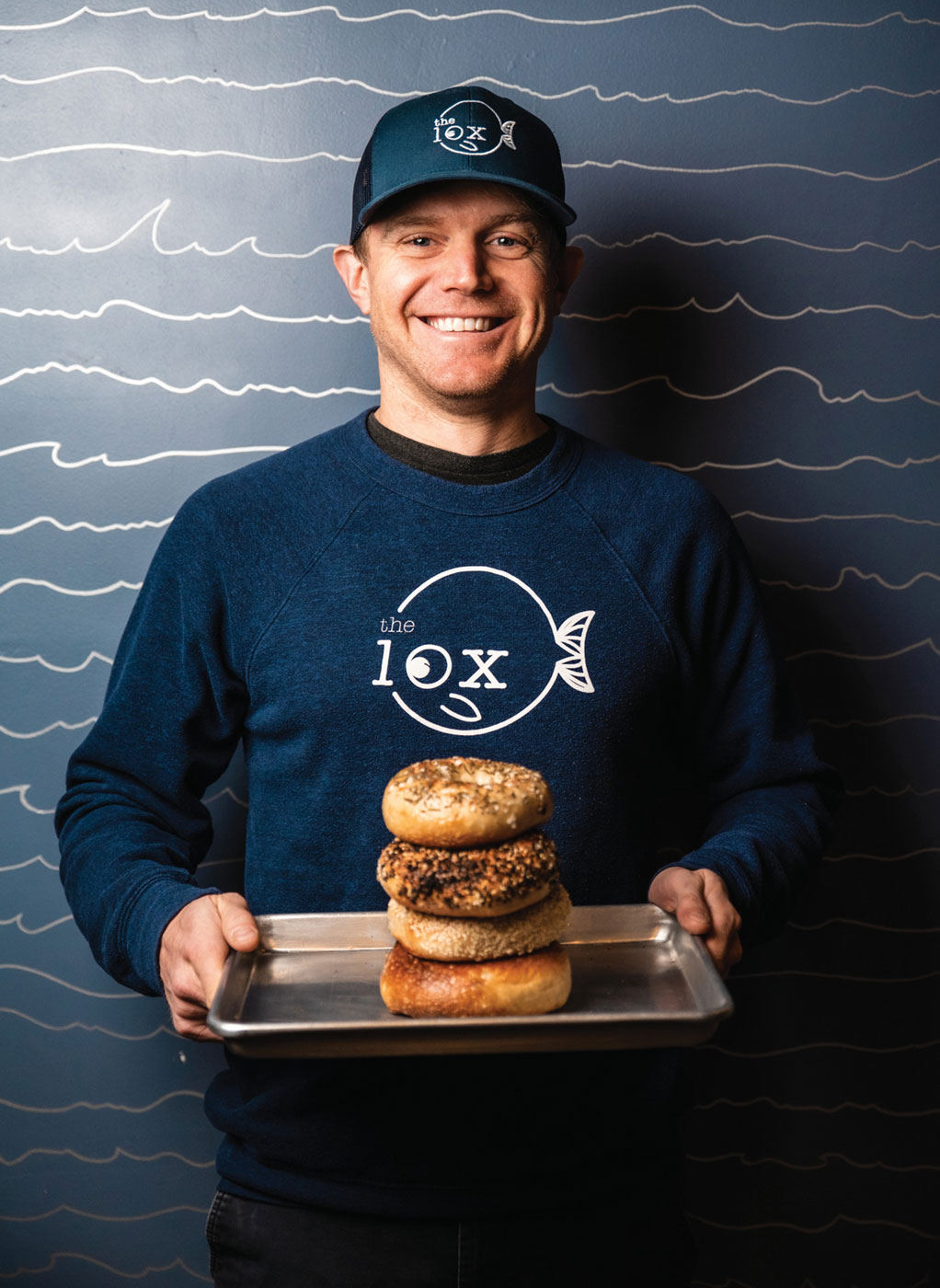
Kevin Crowley, owner of Lox Bagel Shop. Photo by Blake Needleman.
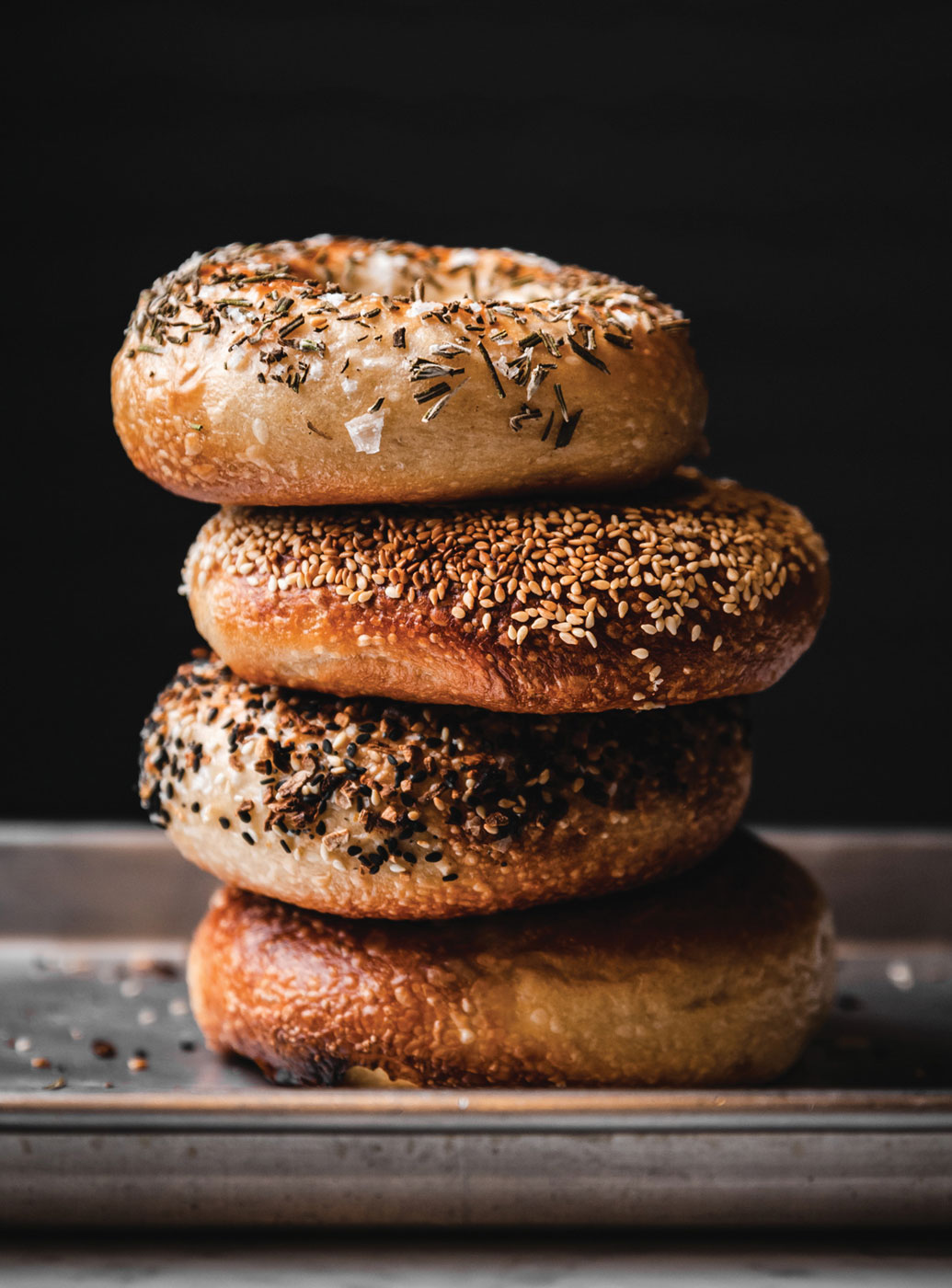
A partnership with Fusian gave Lox Bagel Shop a chance to offer delivery of its bagels. Photo by Blake Needleman.
THE LOX BAGEL SHOP: A NEW PARTNERSHIP
Long. This may be the best word to describe how the days have felt since all bars and restaurants were ordered to close dining rooms in March. The initial shock of this news impacted the entire hospitality community. For Lox Bagel Shop owner Kevin Crowley, this shift was something he was prepared for. The day before the state order, Crowley had already limited operations to carryout only and did not allow guests inside the shop.
Crowley said the emotional and physical toll of uncertainty for both the business and his staff weighed heavily on him in the beginning stages of the pandemic. Each day he was forced to evaluate the pros and cons of keeping the shop running. Ultimately, he decided that providing for the community, keeping his team employed and keeping morale high were reasons enough to stay open. In fact, Crowley was able to retain his entire team and did not have to lay off or furlough a single employee, a rare situation for a food business during the global pandemic.
Crowley said there are several factors contributing to Lox being able to successfully weather the ongoing storm, including the ability to get a federal Paycheck Protection Program loan as soon as it became available. The loan is from a Small Business Administration program that helps businesses retain their workforce during the pandemic.
He also credits a new partnership that Lox formed with local sushi restaurant Fusian. In the early days of the pandemic, Fusian launched a grocery delivery service after quickly realizing that people were not comfortable leaving their houses and that grocery stores were rapidly selling out of common items. Members of the Fusian leadership team, who were already regular customers at Lox, reached out to Crowley about an opportunity to partner. With the partnership, the “Fusian Fleet” would not only be able to bring grocery items to customers’ doorsteps, but also family packs of bagels and spreads from Lox. This partnership was beneficial to both from a marketing and sales perspective, especially in the first few weeks when few people were leaving their homes.
While the days may be long and times uncertain, Lox has found a way to continuously adapt to the ever-changing needs of the community. When asked what he’s been most surprised by, Crowley said it was the reaction of people in the community. Their generosity, patience and continued support have allowed Lox to be resilient in the face of unprecedented times.
Lox Bagel Shop, 772 N. High St., updates availability of its menu items at facebook.com/theloxbagelshop.
—Anna Kurfees
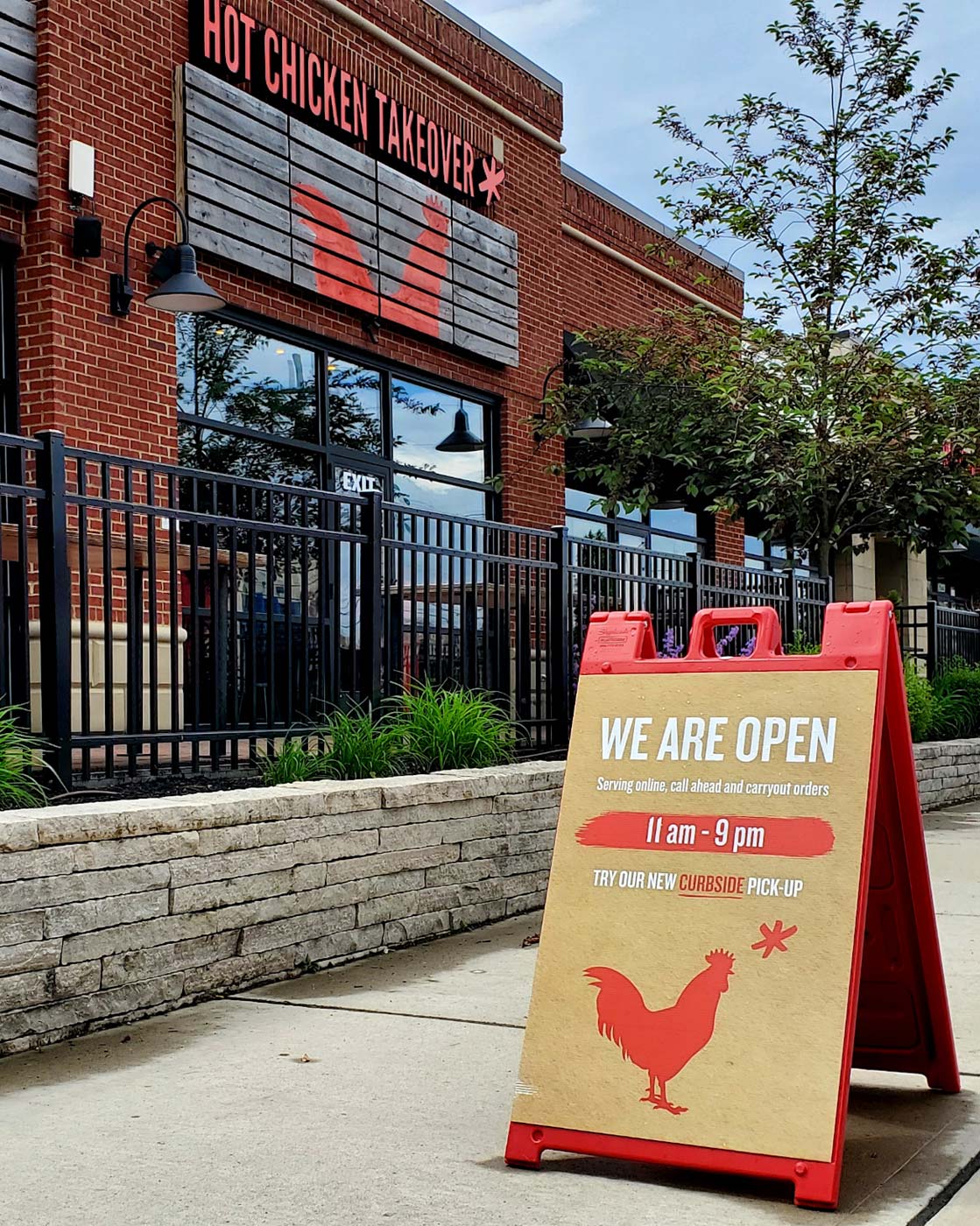
Hot Chicken Takeover will continue to offer carryout while studying how to open its dining areas. Photo by Edible Columbus.
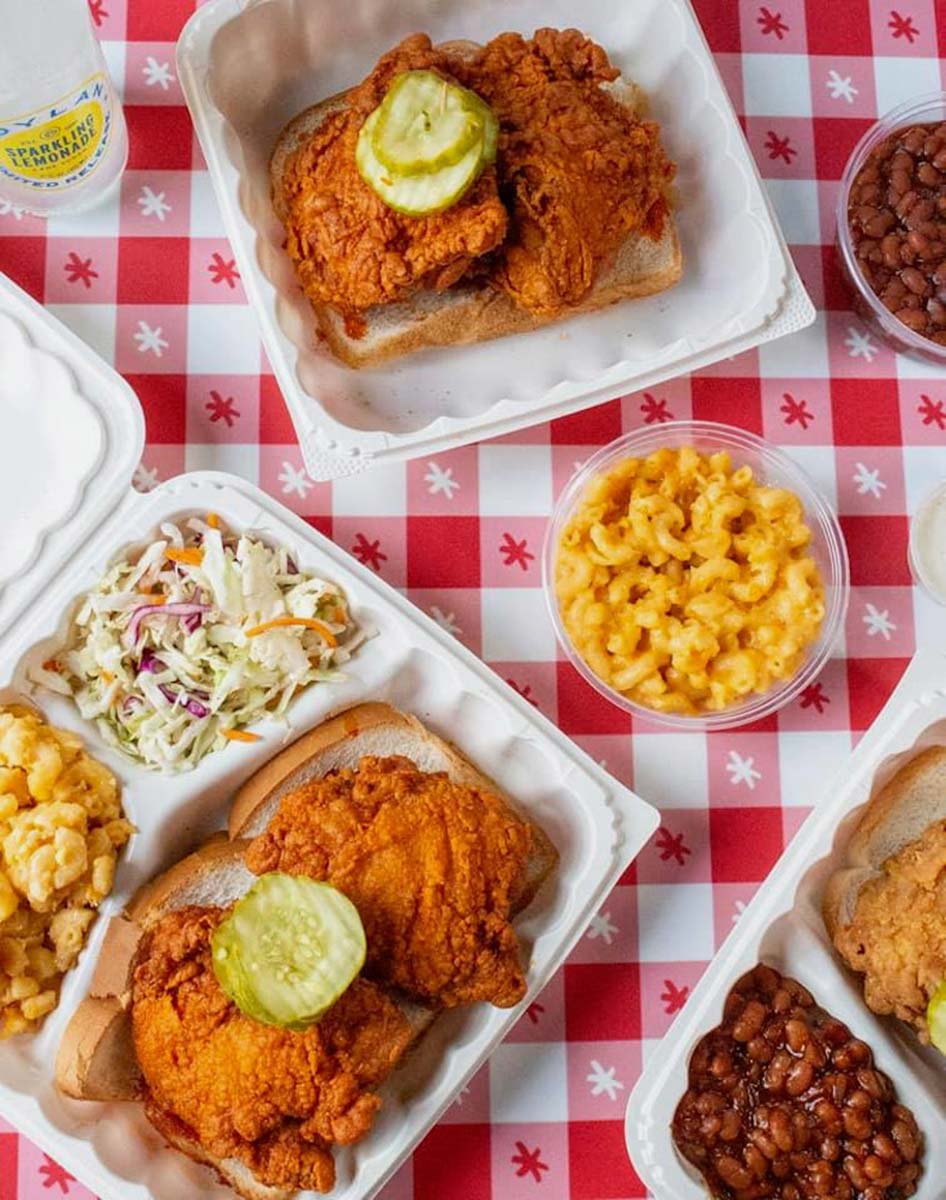
The shutdown gave Hot Chicken Takeover a chance to make some menu changes. Photo by Edible Columbus.
HOT CHICKEN TAKEOVER: MASTERING ‘THE ART OF CARRYOUT’
The three locations of the popular Hot Chicken Takeover restaurant have always offered meals to go, so they were well prepared when a state order closed restaurant dine-in service in March. Even so, by the end of that first week, founder Joe DeLoss made the decision to shut down the restaurants completely.
“We had to put our team members first,” he said. Carryout demand was growing by the day, but the small kitchens in the restaurants did not allow for proper safe distancing in food preparation. “We decided if we can’t do it safely, we can’t do it.”
The shutdown meant workers lost their hours, but they kept their benefits, he said. Hot Chicken Takeover was founded to give second-chance employment to people who had been in prison or were recovering from addiction or other problems, so access to things like health care was important.
The management team used the downtime to work on menu changes and maintenance issues. DeLoss himself helped to spearhead a nonprofit campaign to feed people in need, We Are All In This Together. Money raised in that campaign paid restaurant kitchens to make meals for health care workers, families of hospitality workers and others. Hot Chicken Takeover was able to bring back some workers to staff the kitchen at its North Market location to help make up to 1,000 of those community meals each week.
The first step back to serving customers came on May 18 when the restaurant’s Clintonville location began to serve carryout meals again—and a record crowd showed up. It was a chance to test the waters and try out the new customized menu that lets customers order a la carte any of the side dishes, such as slaw, mac or baked beans. The centerpiece remains the Nashville-style spicy chicken, available at four levels of heat.
DeLoss expects to add carryout at the other locations as they work out the processes.
“At this point, our orientation is to really master the art of carryout for our brand,” DeLoss said, especially with the possibility of new COVID-19 spikes to come. “We are looking at plans for what dine-in would look like safely in our restaurants, but it’s not a primary emphasis right now.”
Hot Chicken Takeover is open daily for carryout at its Clintonville location. Get updates at hotchickentakeover.com.
—Gary Kiefer
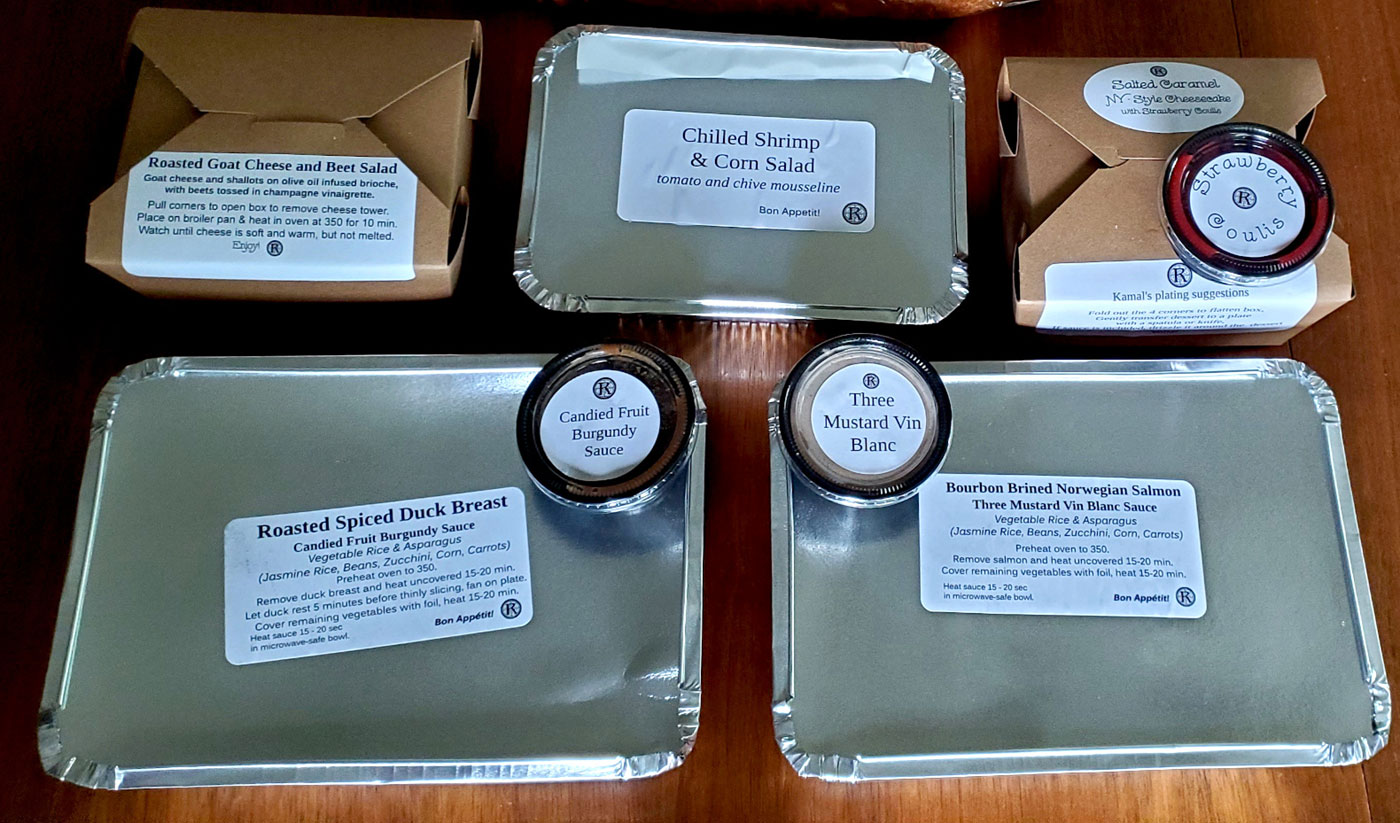
The Refectory began offering assemble-at-home versions of its upscale meals. Photo by Edible Columbus.
OTHER SOLUTIONS
The Refectory is consistently recognized as one of the city’s top restaurants, with a reputation for fine dining and excellent service. But for the first time in its 44-year history, the restaurant began to offer a takeout menu—the only one in the city featuring Roasted Spiced Duck Breast or French Country Terrine with Foie Gras. Although dine-in restrictions began to ease in late May, owner Kamal Boulos is still evaluating how and when to reopen. “We are overwhelmed with your incredible kindness, support and generosity,” he wrote in an email to customers.
Lindey’s, another upscale restaurant in German Village, made national news in March when it started including a roll of toilet paper with each takeout order. Panic buying had emptied store shelves of toilet paper, but Lindey’s was well stocked and had no customers to use it. Once it was allowed, Lindey’s opened some tables on its patio and in the dining room. Employees are required to wear masks.
Not returning: Unfortunately, several Columbus restaurants have been put up for sale or closed permanently. Those for sale include The Table in the Short North and two of the Grow Restaurant concepts: The Sycamore in German Village and Cosecha Cocina in Italian Village. Firefly Bistro in New Albany announced its closing, and the Miller’s Ale House chain has closed both of its Columbus locations.




